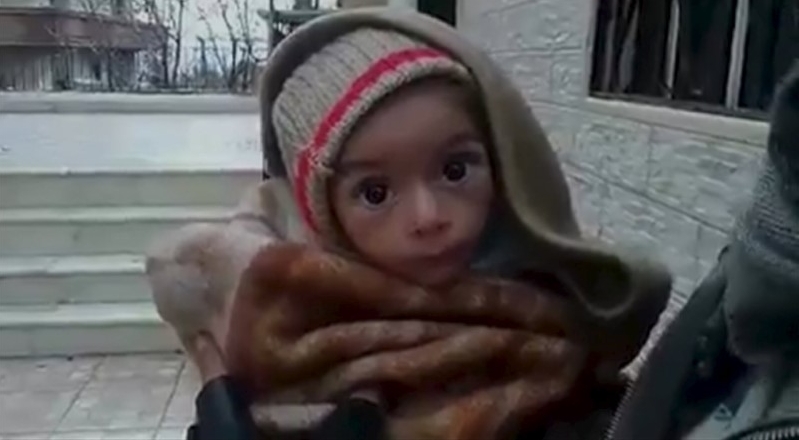
Warnings of widespread starvation are growing as pro-government forces besiege an opposition-held town in Syria and winter bites, darkening the already bleak outlook for peace talks the United Nations hopes to convene this month.
The blockade of Madaya, near the border with Lebanon, has become a focal issue for Syrian opposition leaders who told a U.N. envoy this week they will not take part in talks with the government until it and other sieges are lifted.
The United Nations says it has received credible reports of people dying from starvation in the town. The Syrian Observatory for Human Rights, which tracks the war, puts the toll at 10, while opposition activists say it is in the dozens.
Reuters could not independently confirm the reports.
"We were living on tree leaves, on plants, but now we are struggling in a snow storm and there are no more plants or leaves," said Majed Ali, 28, an opposition activist who spoke to Reuters by phone from Madaya.
"I was 114 kilos before the siege. Now I am 80."
The United Nations said the Syrian government on Thursday approved access and it was preparing an aid delivery "in the coming days", along with a delivery to two villages in northwest Syria besieged by rebels.
Residents in Madaya, where the United Nations says some 40,000 people are at risk, meanwhile make do with water flavored, where available, with spices, lemon, salt and vinegar, said Abu Hassan Mousa, the head of an opposition council in Madaya.
Where rice or powdered milk are available, the prices can reach some $300 a kilo, residents said.
With half a meter of snowfall this week, furniture, doors and wooden fixtures and fittings are being burnt to heat homes, said Ali, the opposition activist.
"Negotiations have no meaning all the time we are besieged, all the time we are hoping for a cup of milk for a child. What are we going to negotiate over? Our dead?" he said.
MONTHS WITHOUT AID
Blockades have been a common feature of the nearly five-year-old war that has killed an estimated 250,000 people. Government forces have besieged rebel-held areas near Damascus for several years and more recently rebel groups have blockaded loyalist areas including the two villages in Idlib province.
The blockade of Madaya began six months ago when the Syrian army and its Lebanese ally, Hezbollah, started a campaign to reestablish President Bashar al-Assad's control over areas along the Syrian-Lebanese border.
Responding to accusations that Hezbollah was starving the people of Madaya, the group denied in a statement there had been any deaths in the town, and accused rebel leaders of preventing people from leaving.
It said rebels in the town had taken control of aid which they were selling to those who could buy. The people of Madaya were being exploited in a propaganda campaign, it said.
A statement issued by two senior U.N. officials said "almost 42,000 people remaining in Madaya are at risk of further hunger and starvation".
"The UN has received credible reports of people dying from starvation and being killed while trying to leave," it said.
The aid delivery to Madaya had been approved together with one to al-Foua and Kefraya - the two Shi'ite villages besieged by rebels in Idlib province, the U.N. said.
The areas were all part of a local ceasefire deal agreed in September, but implementation has been halting.
The last aid delivery to Madaya, which happened in October, was synchronized with a similar delivery to the villages.
Aid agencies were hoping for easier access to the area following the ceasefire deal concluded under U.N. supervision.
The Britain-based Observatory says 15 people including children had been killed while trying to flee Madaya, either shot dead or killed by landmines planted to enforce the blockade imposed by government forces and Hezbollah fighters.
Syrian officials could not be reached for comment. Aid agencies say access to Madaya was requested six times in 2015, but provided only once.
AWAITING ANSWERS
A U.N. commission of inquiry has said siege warfare has been used "in a ruthlessly coordinated and planned manner" in Syria, with the aim of "forcing a population, collectively, to surrender or suffer starvation".
One siege is by the Islamic State group, on government-held areas of the city of Deir al-Zor.
A U.N. Security Council adopted on Dec. 18 setting out a road map for peace talks calls on the parties to allow aid agencies unhindered access throughout Syria, particularly in besieged and hard-to-reach areas.
A newly formed opposition council set up to oversee negotiations has told U.N. envoy Staffan de Mistura that this must happen before the talks he plans to hold on Jan. 25.
They also told him that before negotiations, Assad's government, which has military support from Russia and Iran, must halt the bombardment of civilian areas and barrel bombing, and release detainees in line with the resolution.
"We find that it will not be possible to start negotiations while bombardments continue on civilian areas and residents," Riad Nassan Agha, a member of the opposition body, told Reuters. "We must also show our people certain accomplishments."
"We are awaiting answers from Mr Di Mistura."
Pro-government forces surrounding the town, believed by locals to be Hezbollah fighters, have offered food in exchange for weapons handed in by rebel fighters, residents say.
A spokesman for the International Committee of the Red Cross said it hoped to deliver aid to both Zabadani and Madaya, and al-Foua and Kefraya in the coming days.






